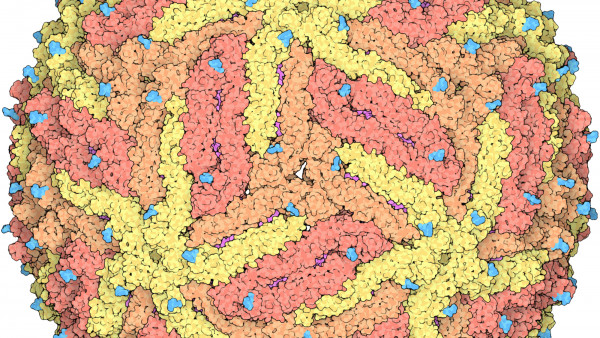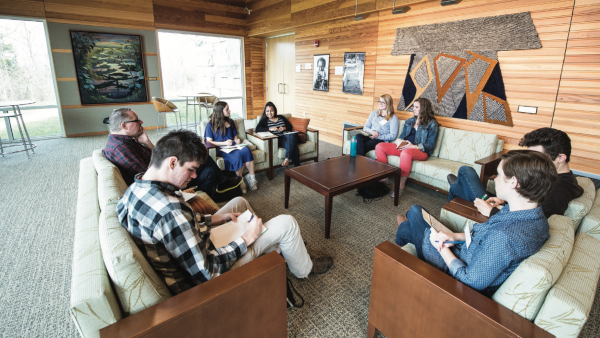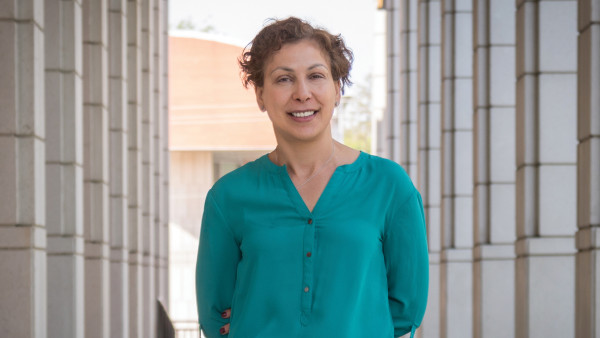Prindle’s Purpose
Janet Prindle had had a successful career on Wall Street, serving as a pioneer for women and proving that socially responsible investing pays off.
Her success presented the 1958 DePauw University graduate with another investment decision: how and when to distribute her holdings. “The issue for me,” she said in 2007, “was either to give money away when I die or to do so while I’m still alive so I can gain satisfaction from seeing it make a difference for a place that I love.”
She chose the latter, endowing her alma mater with funds that enabled it to establish the Janet Prindle Institute for Ethics and construct a showcase building that was the first in Indiana to earn a gold rating for energy efficiency and environmental design from the U.S. Green Building Council.
The institute is the only national ethics institute at a liberal arts college, says Andrew Cullison ’01, its Phyllis W. Nicholas endowed director.
Prindle’s vision, he says, was for the institute to enhance ethical training on DePauw’s campus as well as “pure national engagement – to try to get the nation to think about the critical issues of our time.” To meet both goals, the institute has undertaken a variety of projects and programs, including:

The institute is the only national ethics institute at a liberal arts college, says Andrew Cullison ’01, its Phyllis W. Nicholas endowed director.
Prindle’s vision, he says, was for the institute to enhance ethical training on DePauw’s campus as well as “pure national engagement – to try to get the nation to think about the critical issues of our time.” To meet both goals, the institute has undertaken a variety of projects and programs, including:
- PRINDLE POST: This digital periodical each week publishes five to seven explanatory articles about ethical issues and popular culture, about half of which are written by scholars from around the country. Students write the rest. A “best of” collection is printed annually and distributed to K-12 schools, the DePauw community, Prindle alumni and prospective students.
- EXAMINING ETHICS: This podcast provides content about ethics, including interviews with ethics experts and stories of regular people’s struggles with ethics in their everyday lives.
- PEA SOUP: This scholars’ blog, which has been connected to DePauw since 2016, provides a forum to discuss philosophy, ethics and academia.
- UNDERGRADUATE ETHICS SYMPOSIUM: Through a rigorous selection process, 25 to 28 students from institutions across the country are invited to the annual three-day gathering, where they consider pressing ethical issues and present their work to one another.
- APPLIED EPISTEMOLOGY RESEARCH RETREAT: Doctoral graduates and candidates in philosophy may apply to attend the eight-day retreat, where attendees from around the country workshop papers they have written on applied epistemology.
- SUMMER HIGH SCHOOL ETHICS BOWL INVITATIONAL: Any school in the country that finished in the top four of its regional competition may participate in this July event, which is capped at 20 teams.
- LECTURES: Prindle partners with Delta Gamma and the Delta Gamma Foundation to sponsor the Dorothy Garrett Martin Lecturer on Ethics and Values. Tarana Burke, who started the #MeToo movement, which went viral and was named Time’s 2017 Person of the Year, is scheduled to speak Sept. 6. Four people who recently earned their doctoral degree in philosophy are invited to DePauw each fall for the Young Philosophers Lecture Series.
- EDUCATION: Prindle offers credit-bearing, graded courses in which students delve into a single work that speaks to ethical issues. The $300 Prindle Prize is awarded to students who submit papers that address ethics and that were prepared for a class in another discipline. Prindle hires student interns, who create and promote the institute’s events and programs or write for the Prindle Post. DePauw also sponsors Ethics Bowl and Bioethics Bowl teams.
- RESEARCH: Faculty members are awarded grants for sabbaticals or student/faculty summer research to work on projects that address ethical questions.
- COMMUNITY ENGAGEMENT: High school students are awarded $300 each for essays that consider ethical issues involved in a specified subject. The weeklong Express CAMP, which stands for character, attitude, morals and perspective, is available to Putnam County, Ind., students in grades one through five, who are exposed to philosophy through the stories and themes of well-known children's books.
- SOCIAL ENTREPRENEURSHIP: Grants are made to DePauw students in the early stages of planning a nonprofit, a for-profit with a social mission or a for-profit whose founder demonstrates a commitment to ethical reflection.
DePauw Magazine
Summer 2018
 Art and science and serendipity
Art and science and serendipity Encouraging an ethical ethos
Encouraging an ethical ethos Front & center
Front & center Prindle’s Purpose
Prindle’s Purpose Ethics in disciplines
Ethics in disciplines Your brain on ethics
Your brain on ethics
DePauw Stories
A GATHERING PLACE FOR STORYTELLING ABOUT DEPAUW UNIVERSITY
Browse other stories
-
Athletics
-
Men's Basketball - Trio of Tigers Earn All-NCAC Men's Basketball Honors
-
Women's Basketball - Tigers Travel to Carroll College for NCAA Opening Round
-
Baseball - Tigers Drop Final Game in Memphis
More Athletics
-
-
News
-
Francesca Seaman Speaks the Language of Mentorship
-
DePauw Announces $10 Million Matching Challenge for Student Scholarships
-
DePauw University Remembers Esteemed President Emeritus Robert G. Bottoms
More News
-
-
People & Profiles
-
Empie, Party of Five: One Family’s Unique DePauw Bond
-
Entrepreneurs Eric Fruth ’02 and Matt DeLeon ’02 Are Running More Than a Business
-
Rick Provine Leaves Legacy of Leadership and Creativity
More People & Profiles
-
-
Have a story idea?
Whether we are writing about the intellectual challenge of our classrooms, a campus life that builds leadership, incredible faculty achievements or the seemingly endless stories of alumni success, we think DePauw has some fun stories to tell.
-
Communications & Marketing
101 E. Seminary St.
Greencastle, IN, 46135-0037
communicate@depauw.eduNews and Media
-
News media: For help with a story, contact:
Bob Weaver, Senior Director of Communications.
bobweaver@depauw.edu.